Overview
Securing a buy-to-let mortgage as a non-resident in the UK presents unique challenges, including higher deposit requirements and stringent eligibility criteria. Moreover, understanding the specific financial and tax implications associated with such investments is crucial. Despite these hurdles, leveraging expert guidance can significantly enhance your investment strategy. By grasping the nuances of the UK real estate market, non-residents can empower themselves to invest successfully and capitalize on lucrative rental yields.
Introduction
In recent years, the UK property market has emerged as an enticing opportunity for non-resident investors, particularly in the realm of buy-to-let mortgages. With the potential for attractive rental yields and property appreciation, foreign buyers are increasingly seeking ways to capitalize on this lucrative market.
However, the journey to securing a buy-to-let mortgage is fraught with challenges, including higher deposit requirements and navigating complex eligibility criteria.
This article delves into the intricacies of buy-to-let mortgages for non-residents, offering insights into the financial considerations, tax implications, and strategies for overcoming common obstacles. By understanding these factors, investors can effectively position themselves to take advantage of the opportunities within the UK property landscape.
Understanding Buy-to-Let Mortgages for Non-Residents
A buy-to-let loan is a specialized financing option designed for individuals aiming to acquire real estate for rental purposes. For non-residents, securing a buy-to-let mortgage in the UK presents a significant opportunity to invest in the thriving UK real estate market from abroad. However, non-resident investors often face unique challenges with a buy-to-let mortgage, including higher deposit requirements—typically around 25% or more—and more stringent eligibility criteria compared to their UK resident counterparts.
Understanding these nuances is crucial for navigating the complexities of the financing landscape.
In 2023, the average loan value for a buy-to-let property acquisition was just below £158,500, while the average for remortgages stood at approximately £149,000. These figures underscore the financial commitment involved in entering the buy-to-let mortgage market, particularly for non-residents who may also contend with additional hurdles such as currency fluctuations and varying tax implications. Notably, the next edition of the lending statistics will be published on June 10, 2025, offering further insights into the evolving market.
Buy-to-let loans differ significantly from standard residential loans. While residential loans primarily focus on the borrower's ability to repay based on personal earnings, buy-to-let loans assess the potential rental income generated by the property. This shift in focus can be advantageous for non-residents, as it enables them to leverage rental yields to secure a buy-to-let mortgage. Case studies illustrate the effectiveness of tailored financial solutions in overcoming these challenges.
For instance, Finance Story has successfully assisted non-resident clients in navigating the intricacies of buy-to-let loans, providing personalized support that emphasizes understanding each client's unique situation. By leveraging its expertise in crafting polished and highly individualized business cases, Finance Story has helped clients tackle specific challenges, such as securing favorable deposit terms and comprehending tax implications. Furthermore, Finance Story offers a comprehensive range of lenders, including high street banks and innovative private lending panels, ensuring clients have access to diverse financing options.
Testimonials from satisfied clients highlight the brokerage's commitment to streamlining the loan process, ensuring that investors feel confident and informed throughout their experience.
In summary, a buy-to-let mortgage in the UK provides non-residents with a means to capitalize on the UK real estate market, despite the inherent challenges. By understanding the specific characteristics of these mortgages and utilizing expert guidance from Finance Story, including refinancing options for commercial assets, investors can effectively navigate the landscape and secure favorable financing tailored to their needs.
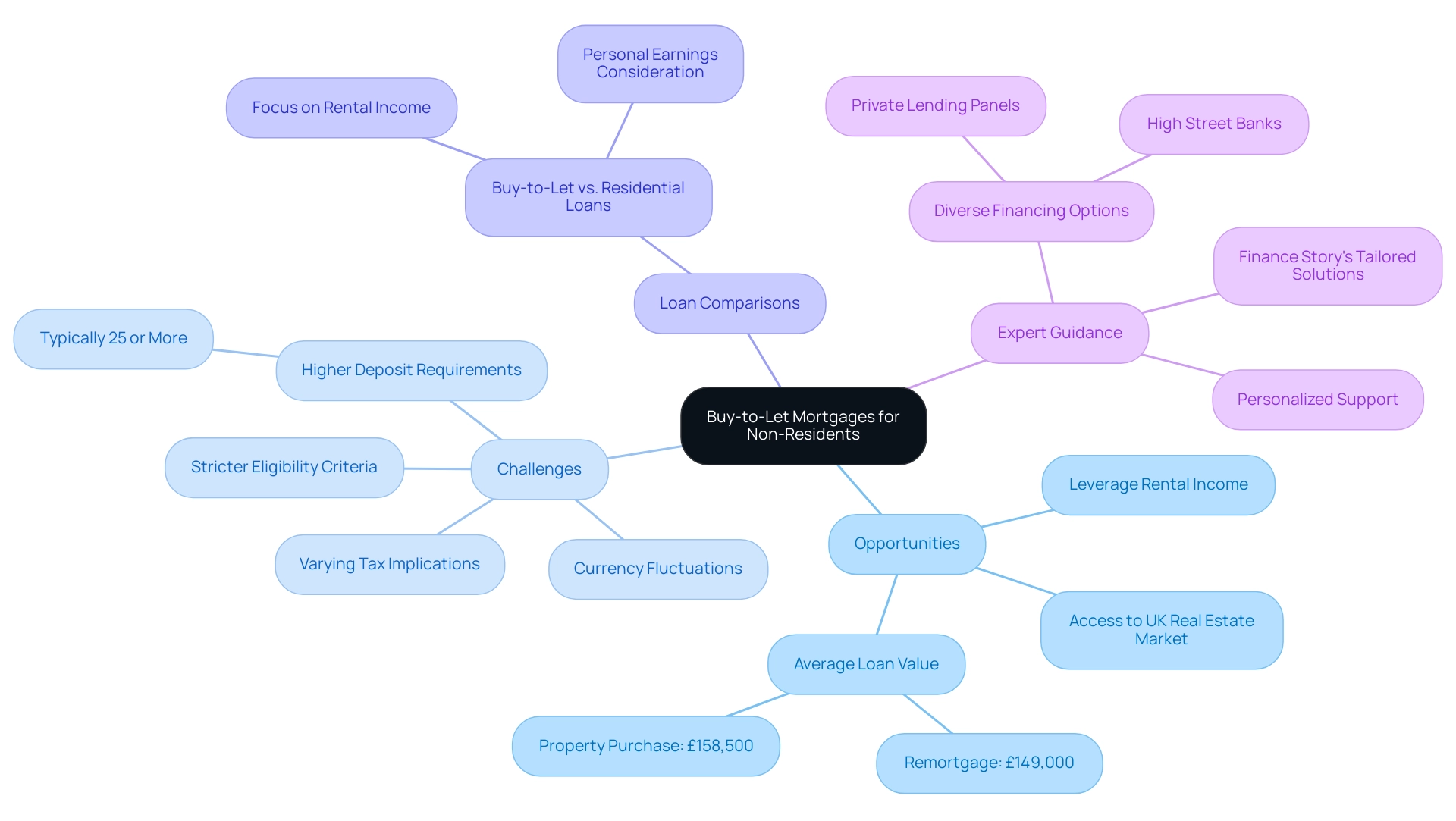
The Rising Appeal of Buy-to-Let Investments for Non-Residents
The UK real estate market has witnessed a significant surge in interest from non-resident investors, particularly in 2025. This trend is primarily driven by attractive rental yields, consistent real estate appreciation, and a stable economic environment. Non-residents are increasingly drawn to buy-to-let mortgage options for UK properties as a strategic means to diversify their portfolios and generate passive income.
Furthermore, the depreciation of the pound against other currencies enhances the appeal of UK real estate, making it more accessible to foreign buyers.
In recent years, the UK government has introduced measures such as a 2 percent stamp duty surcharge on foreign buyers, reflecting ongoing policy discussions regarding foreign involvement in housing. Despite these challenges, the potential for substantial returns continues to attract non-resident investors. Current rental yields for buy-to-let real estate in the UK remain competitive, with many regions offering yields that surpass those found in other major sectors.
Experts in real estate highlight the benefits of buy-to-let mortgage ventures for non-residents, emphasizing that these options can provide a reliable income source and long-term capital appreciation. Additionally, the UK real estate sector is regarded as a safe haven, especially in uncertain global economic conditions. This sentiment is supported by research indicating that foreign funding can influence local housing dynamics.
Filipa Sá, a researcher, notes, "There is evidence that overseas funding decreases home ownership rates, indicating that some residents may be priced out of the market in areas where foreign investors are more active and must lease rather than own their homes."
Case studies illustrate the success of ventures involving buy-to-let mortgages for non-residents, showcasing how foreign investors have capitalized on trends to acquire lucrative assets. For instance, the case study titled "Foreign Investment and Housing Construction" examines the relationship between foreign investment and housing dynamics, revealing that while foreign investment does not significantly impact the number of housing starts, it negatively affects long-term vacant dwellings in both high and low elasticity areas. These examples underscore the reasons for non-residents to consider investing in UK buy-to-let mortgage opportunities in real estate, including potential tax advantages and the chance to establish a foothold in a robust real estate sector.
As the landscape evolves, non-resident investors are strategically positioned to navigate the complexities of the UK real estate market and leverage its opportunities.
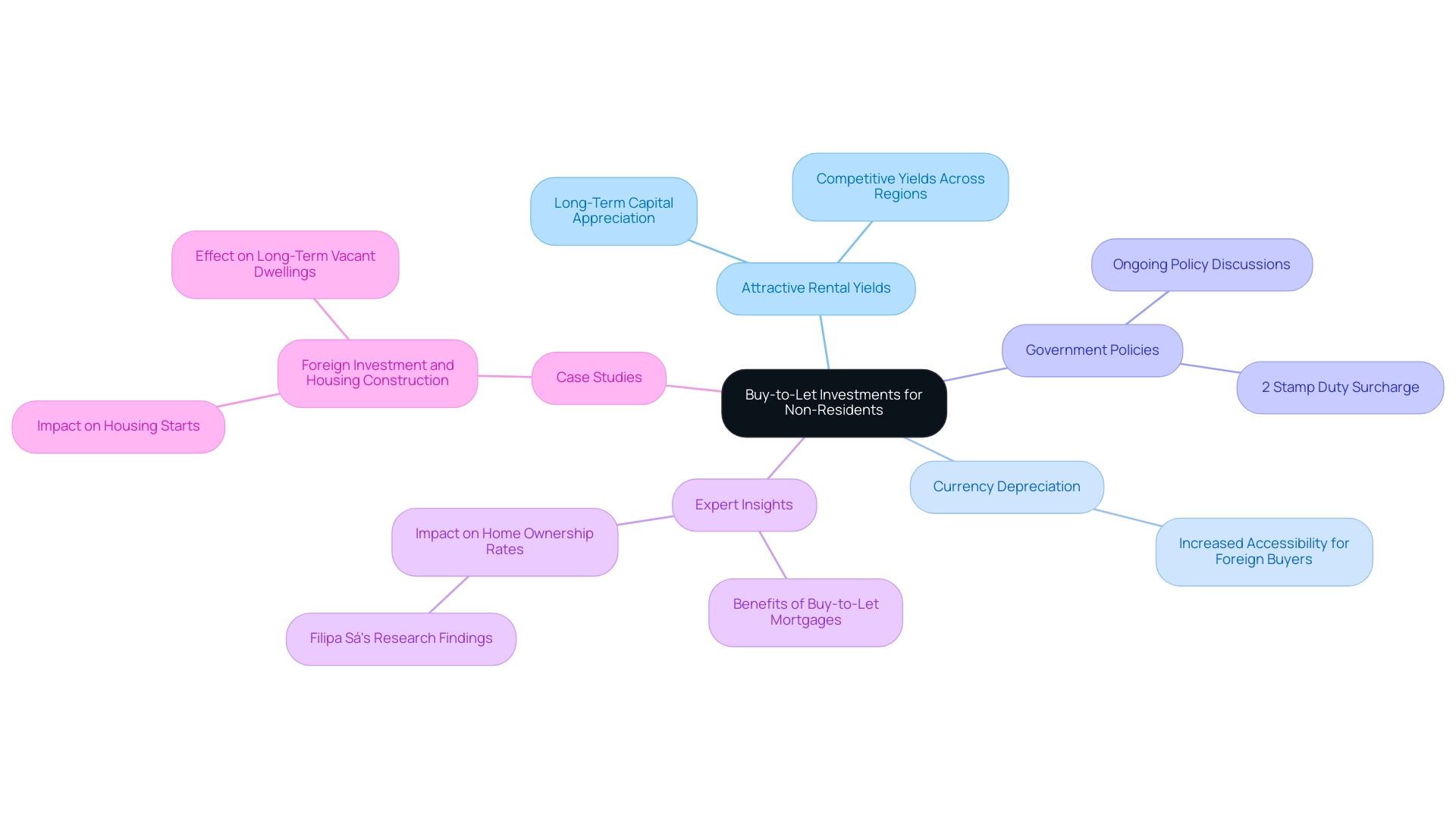
Eligibility Criteria for Non-Residents Seeking Buy-to-Let Mortgages
To qualify for a buy-to-let mortgage as a non-resident, applicants must navigate several key criteria that lenders typically enforce:
- Deposit Requirements: Most lenders mandate a deposit of at least 25%, often ranging up to 40% of the property's value. This substantial upfront investment reflects the increased risk associated with lending to non-residents.
- Income Verification: Applicants must provide proof of income, which can include payslips, tax returns, or bank statements. This documentation is crucial for lenders to assess the applicant's financial stability and ability to meet mortgage repayments.
- Credit History: A strong credit score is essential, as lenders will evaluate the applicant's financial reliability. Non-residents should be prepared to present their credit history, which may involve additional scrutiny if it originates from outside the UK.
- Management Plan: Some lenders may require a detailed plan outlining how the asset will be managed and rented out. This plan should showcase the applicant's comprehension of the rental sector and their approach for managing the asset.
Understanding these criteria is vital for non-residents aiming to prepare their applications for a buy-to-let mortgage effectively. Recent regulatory changes have introduced stress testing based on achievable rental income, which can impact the maximum loan amounts available. Therefore, applicants should ensure their rental projections are realistic and well-supported.
In light of the evolving landscape, including increased transaction costs and changes to capital gains exemptions, prospective buyers should stay informed about the latest developments in UK real estate. As highlighted in a recent case study titled 'Challenges in Measuring the Size of the Private Rented Sector (PRS),' accurate measurement of the PRS is crucial for evaluating future vulnerabilities in the housing sector. This highlights the complexities involved in tracking changes in the rental market and suggests that while outflows have increased, they are not as significant as previously thought.
Additionally, it is important to consider the structure of real estate ownership. According to Liquid Expat Mortgages, a Special Purpose Vehicle (SPV) is a non-trading Limited Company incorporated at Companies House, specifically designed for owning and renting out real estate. This structure enables income and dividends to be extracted from the company, while profits kept within the company can be reinvested into expanding the asset portfolio.
By aligning their applications with these requirements and showcasing a strong grasp of the industry dynamics, non-residents can significantly improve their chances of obtaining a buy-to-let mortgage.
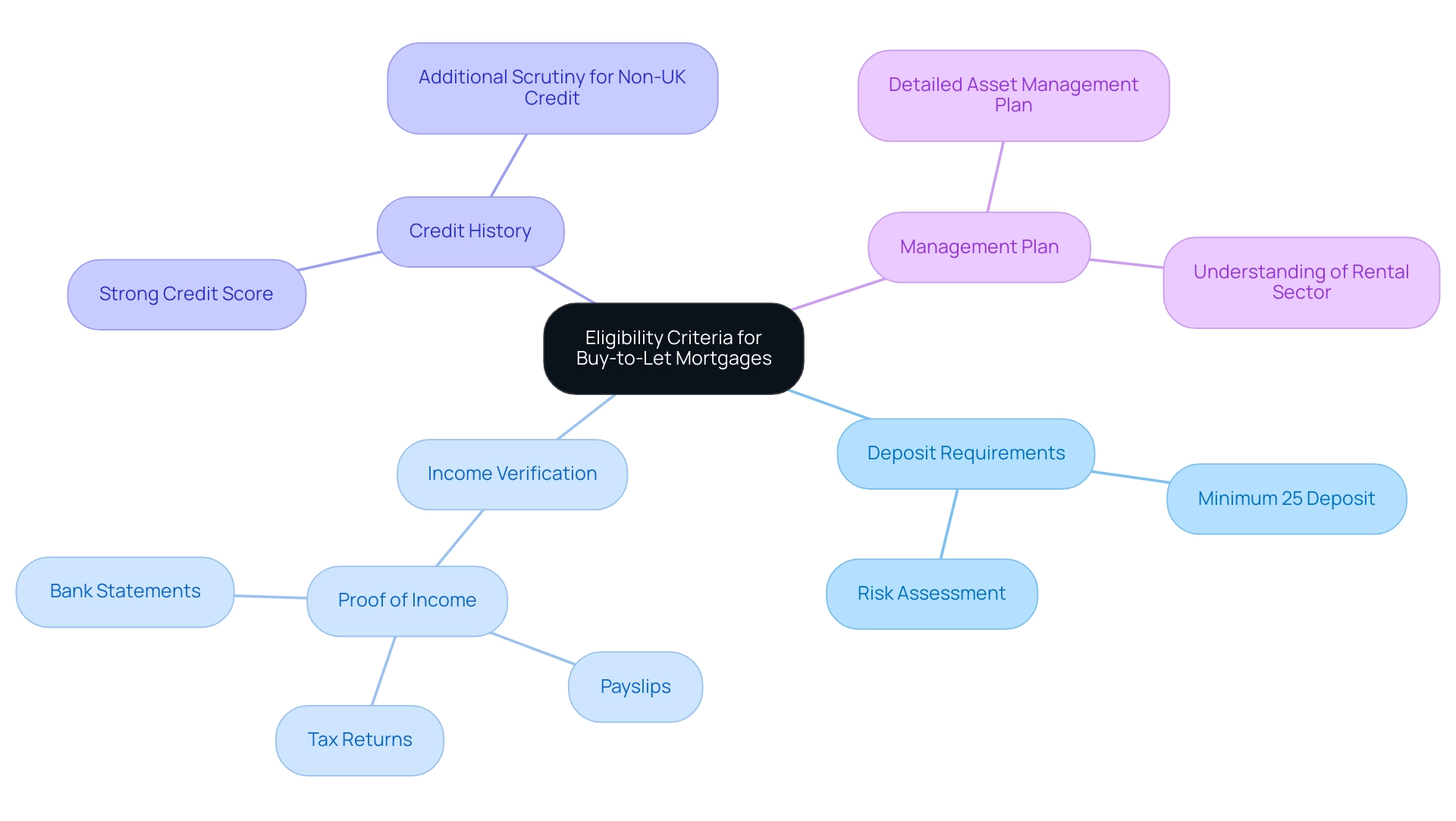
Choosing the Right Lender for Your Buy-to-Let Mortgage
Choosing the right lender for a buy to let mortgage non resident UK is a critical step in your investment journey, especially for non-residents looking to enter the UK property market. Here are essential factors to consider when evaluating potential lenders:
-
Interest Rates: Comparing interest rates across various lenders is vital to identify the most competitive options available. As of 2025, the average interest rate for new buy-to-let loans is approximately 5.22%, reflecting current market conditions. This figure can vary significantly based on the lender's terms and the borrower's profile.
-
Fees and Charges: Be vigilant about additional costs associated with the loan. These may include arrangement fees, valuation fees, and early repayment charges, all of which can impact the overall affordability of your investment. Understanding these fees upfront helps avoid unexpected financial burdens later.
-
Lender Reputation: Conduct thorough research on the lender's reputation by examining customer reviews and industry ratings. A lender with a strong history of reliability and customer satisfaction offers peace of mind throughout the financing process. For instance, Finance Story is recognized for its professionalism and deep understanding of the finance sector, assisting clients in achieving their financial goals efficiently. As one satisfied client, Natasha B. from VIC, noted, "I will definitely be recommending your business to anyone. We are finished with the constant worry. Once again, thank you so much for being a part of our journey." This testimonial underscores Finance Story's commitment to providing tailored solutions that alleviate the challenges faced by small business owners in securing financing.
-
Specialization in Buy to Let Mortgage Non Resident UK: Some lenders specialize specifically in buy to let mortgage non resident UK, leading to more favorable terms and conditions tailored to the unique challenges faced by foreign buyers. Interacting with a lender that understands the intricacies of non-resident financing can enhance your chances of obtaining a suitable loan. Finance Story's access to a comprehensive portfolio of private and boutique commercial investors allows them to offer a diverse range of funding options, ensuring that small business owners can find the right fit for their investment needs.
In addition to these factors, examining case studies that demonstrate successful lender comparisons for a buy to let mortgage non resident UK financing is advantageous. For example, in Q3 2024, the UK sector experienced a significant increase in buy-to-let loans, with 48,862 new loans advanced, totaling £8.6 billion. However, it is important to note that there were also 13,000 buy-to-let loans in arrears, reflecting ongoing challenges in the market despite the overall growth in lending.
Additionally, there were 710 buy-to-let loan possessions taken in the same quarter, indicating some stability but also potential risks for investors.
Furthermore, consulting with financial advisors can provide valuable insights into the best lenders for a buy to let mortgage non resident UK in 2025. As Moubin Faizullah-Khan, Founder and CEO, states, "Leveraging technology and adopting a long-term perspective can also benefit investors when striving for success." Their expertise can guide you in making informed choices that align with your financial goals.
By thoughtfully evaluating these elements, you can effectively assess lenders and select one that meets your specific requirements, ultimately facilitating a fruitful investment in the UK real estate sector.

Preparing Your Documentation for a Successful Application
Assembling the appropriate documentation is crucial for a successful buy-to-let mortgage application for non-residents in the UK, especially for those looking to invest in the UK real estate sector. At Finance Story, we simplify this process to 1, 2, 3, enabling you to save time while we handle the challenging task of locating the best value products available. To streamline your application process, it is essential to gather the following key documents:
- Proof of Identity: A valid passport or government-issued ID is necessary to verify your identity.
- Proof of Address: Recent utility bills or bank statements that clearly show your current residential address are required.
- Income Documentation: This includes payslips, tax returns, or bank statements that confirm your income. Non-residents should be prepared to provide documentation in multiple currencies, as lenders like Brighten accept over 24 income currencies, enhancing accessibility for international buyers.
- Credit Report: A recent credit report is vital to demonstrate your creditworthiness to potential lenders.
- Details of the Asset: Information about the asset you intend to purchase, including its location, estimated rental income, and any relevant market analysis, should be included.
Navigating the documentation process can be challenging, particularly for non-residents who may face unique hurdles. For instance, foreign buyers often encounter ongoing costs such as maintenance, insurance, and council rates, which can complicate their financial planning. A case study illustrates the experience of a Brazilian citizen who, with the assistance of a broker from Finance Story, successfully secured a home loan in Queensland.
Carlos not only acquired a residence for personal use but also transformed it into a rental venture, showcasing the potential advantages of comprehensive documentation and professional advice. He remarked, "With the broker's assistance from Finance Story, I secured a home loan with favorable terms, which has allowed me to enjoy my residence as both a holiday home and a rental investment."
To ensure a smooth application, it is advisable to consult with financial professionals at Finance Story who can provide tailored advice on the documentation needed for buy-to-let mortgage applications for non-residents in the UK. Their insights can help mitigate common documentation issues faced by non-residents, such as discrepancies in income verification or credit history. By preparing the necessary documentation meticulously, non-residents can significantly enhance their chances of securing favorable loan terms and successfully entering the UK real estate market.
Additionally, working with an award-winning lender like Brighten can further establish credibility and authority in the mortgage lending process.
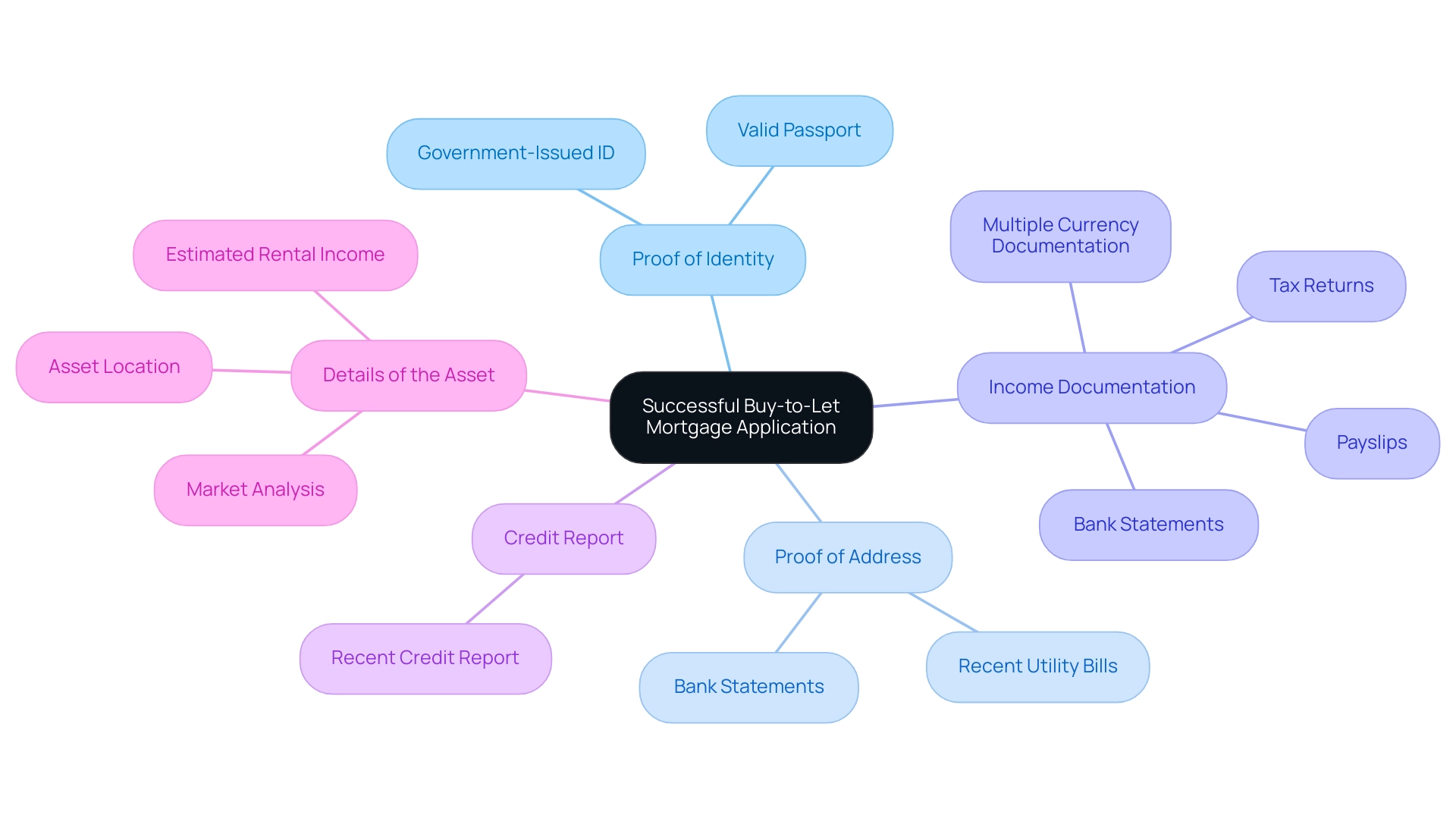
Financial Considerations: Costs and Returns on Buy-to-Let Properties
Investing in a buy-to-let mortgage as a non-resident in the UK requires a thorough understanding of various costs and potential returns. Here’s a detailed breakdown to guide your investment decisions:
-
Initial Costs: Non-residents should anticipate several upfront expenses, including:
- Deposit: Typically, a deposit of 25% to 40% of the property value is required, depending on the lender's criteria.
- Legal Fees: Engaging a solicitor for real estate transactions can range from £1,000 to £2,000, depending on the complexity of the purchase.
- Renovation Costs: If the premises require updates or repairs, budgeting for these expenses is essential, as they can vary widely based on the condition of the premises.
-
Ongoing Costs: Once the property is acquired, landlords must budget for recurring expenses, which may include:
- Maintenance: Regular upkeep is crucial; setting aside 1% to 2% of the property value annually is a common practice.
- Property Management Fees: If you opt for a management service, expect to pay around 10% to 15% of the monthly rental income.
- Insurance: Landlord insurance can cost between £200 and £500 annually, depending on the type of building and coverage.
- Taxes on Real Estate: Non-residents are subject to UK taxes on real estate, including council tax and potentially higher rates for buy-to-let assets.
-
Rental Income: To estimate potential earnings, calculate expected rental income based on current pricing in the area. For instance, real estate in London can yield rental returns of 4% to 6%, while other regions may offer different rates based on demand and location. As Nick Parkhouse notes, "Calculating rental income involves assessing market demand, property location, size, condition, and amenities."
-
Return on Investment (ROI): Evaluating ROI is essential for grasping the profitability of your funds. This involves comparing net rental income against total expenditure, including initial and ongoing expenses. A positive ROI indicates a sound investment, while a negative ROI may signal the need for reevaluation.
The competitive environment for buy-to-let mortgage non-resident UK loans is significant, with major lenders like Lloyds Banking Group holding a substantial share. This concentration can influence pricing and availability of mortgage products, making it essential for investors to stay informed about economic dynamics.
Furthermore, non-residents should consider the tax implications of their financial activities. Chris Demetriou offers free consultations for tax advice, which can be invaluable for navigating these complexities.
By considering these financial implications and leveraging accessible financial advice, non-residents can make informed choices about a buy-to-let mortgage as a non-resident in the UK real estate market, ensuring that they are well-prepared for both the costs and the potential returns associated with their endeavors.
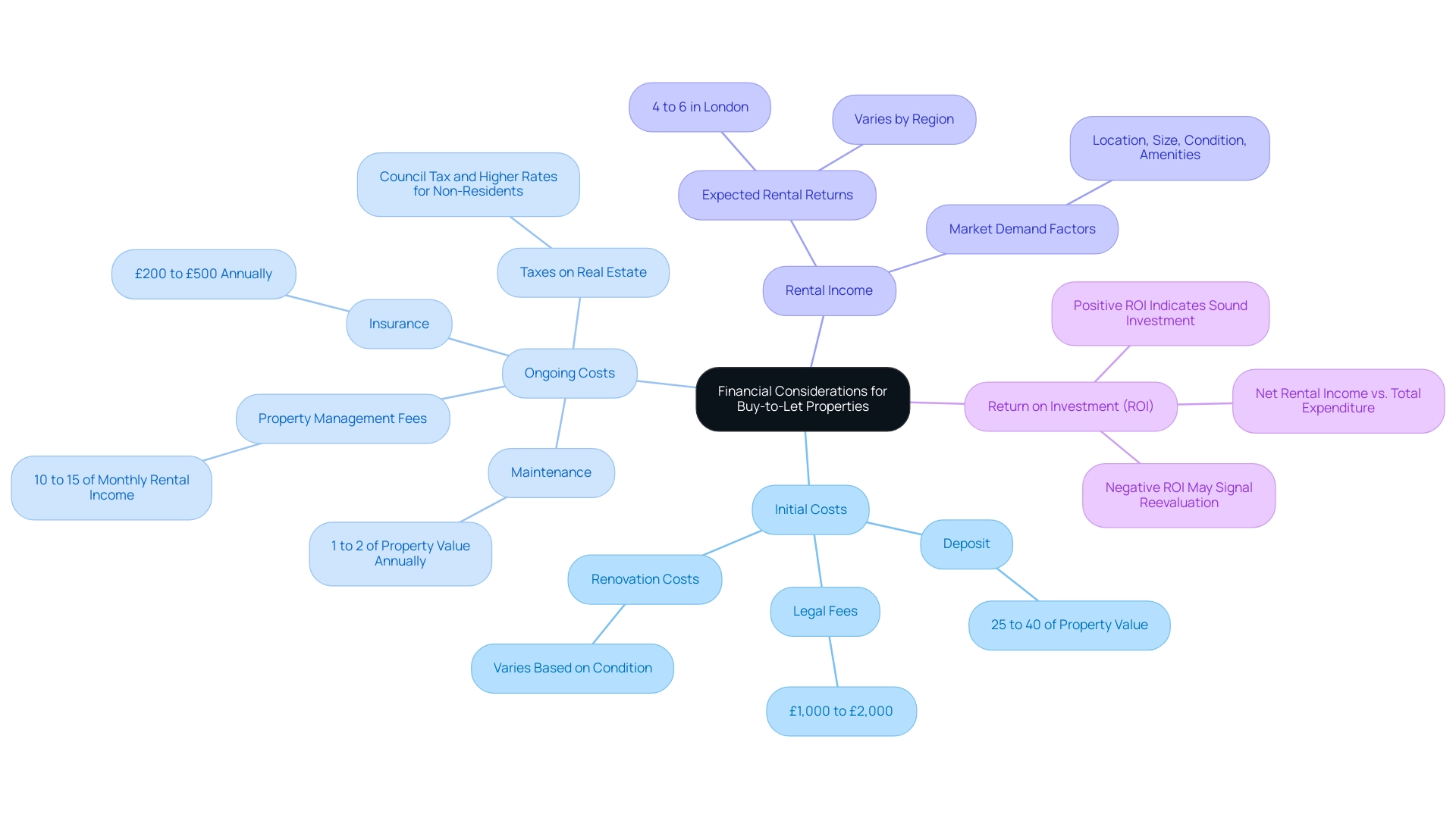
Navigating Property Taxes for Non-Resident Investors
Non-resident investors must navigate several tax implications when considering a buy-to-let mortgage in the UK for their investments. Understanding these obligations is crucial for effective investment management. The primary taxes to consider include:
-
Income Tax: Non-residents are liable for tax on rental income generated from UK properties. This tax applies regardless of the investor's residency status, making it essential to account for this when calculating potential returns.
-
Capital Gains Tax (CGT): If an asset is sold for a profit, non-residents may be subject to CGT. As of 2025, the current rates for CGT on UK real estate for non-residents can vary, and it is important to stay informed about any changes in legislation that could affect tax liabilities.
-
Stamp Duty Land Tax (SDLT): This tax is applicable on real estate purchases and is tiered based on the asset's value. Non-residents should be aware of the SDLT rates, which can significantly impact the overall cost of acquiring real estate.
-
Non-Resident Landlord Scheme: Non-residents may need to register under this scheme to ensure proper tax handling on rental income. This registration helps streamline tax payments and compliance, reducing the risk of penalties.
Navigating these tax obligations can be complex. Insights from tax professionals highlight the importance of understanding the distinctions between individual and corporate taxation in real estate. For instance, individual purchasers may not be liable for certain fixed charges, which can influence overall financial strategy. This distinction is crucial, as it affects the overall tax burden and financial strategy when engaging in real estate transactions.
Furthermore, the use of Jersey unit trusts (JPUTs) is common among investors for acquiring and holding UK commercial real estate, providing transparency for income tax purposes. It is also important to note that the annual exemption cannot be carried forward or transferred to another person, which can impact tax planning.
Recent developments indicate that non-UK residents may not be subject to UK Capital Gains Tax on gains from assets acquired after leaving the UK, depending on double taxation agreements. This nuance highlights the significance of consulting with tax specialists to navigate the intricacies of real estate taxes effectively. As James Odds, Legal Director, notes, "The favorable inheritance tax treatment of pensions is due to change in light of the Budget, with the undrawn value of pensions forming part of a person’s taxable estate on death from 6 April."
This perspective further emphasizes the need for professional guidance in managing tax obligations.
By staying informed about these tax implications and leveraging expert guidance, non-resident investors can manage their buy-to-let mortgage properties in the UK more effectively, ensuring compliance while maximizing their financial outcomes.
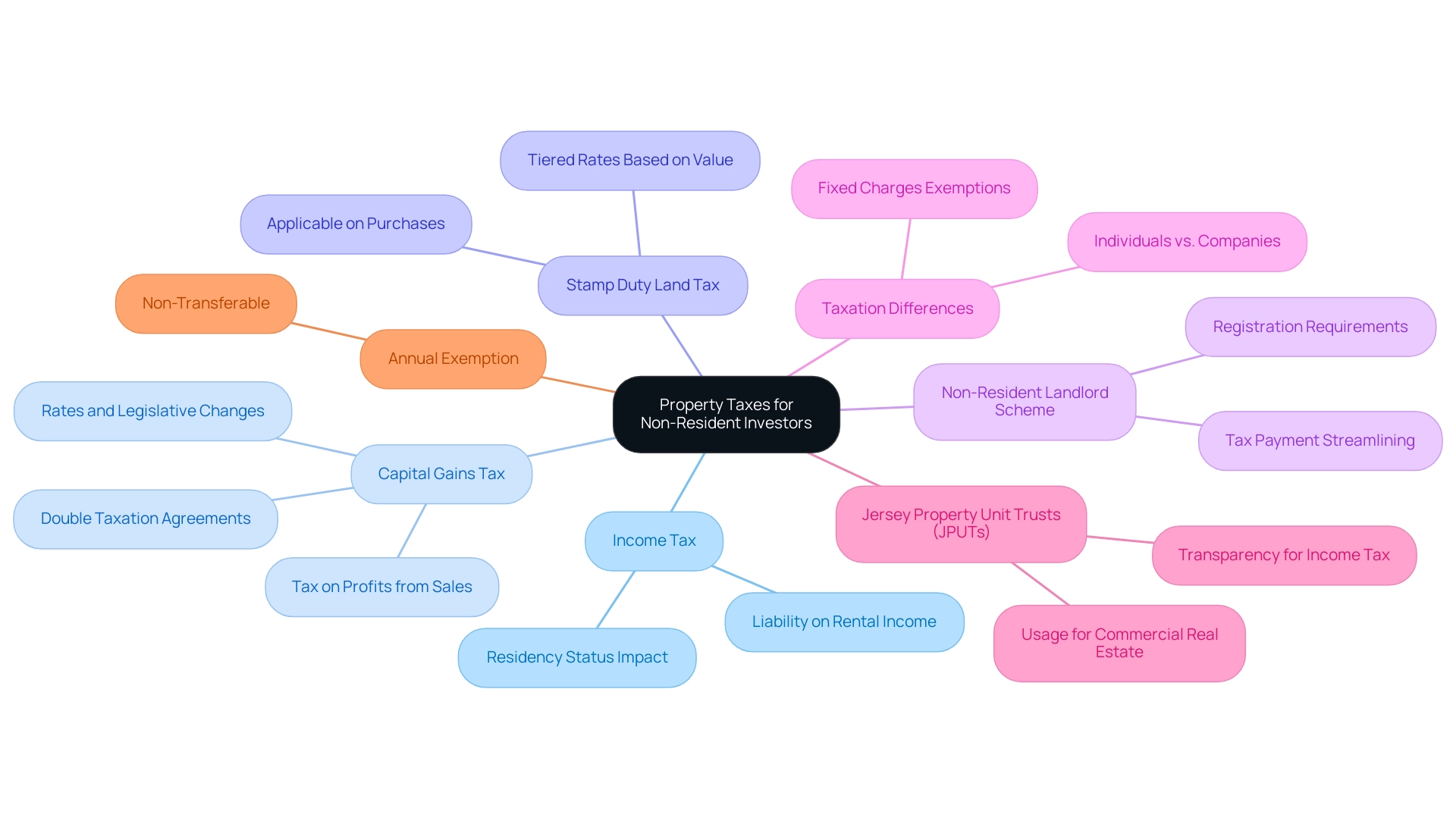
Common Challenges and How to Overcome Them in the Buy-to-Let Market
Investing in buy-to-let real estate as a non-resident presents significant challenges that require careful navigation.
-
Higher Deposit Requirements: Many lenders impose stricter deposit conditions on non-residents, often necessitating deposits of 25% or more. This can significantly restrict funding options and impact overall cash flow.
-
Limited Lender Options: The landscape of lenders willing to offer a buy-to-let mortgage to non-residents in the UK is narrow. As of 2025, only a select number of financial institutions serve this sector, making thorough research essential to identify suitable lenders.
-
Sector Knowledge: Non-residents may lack familiarity with the UK real estate landscape, which can hinder effective selection and accurate rental pricing. Understanding local trends and neighborhood dynamics is crucial for making informed financial decisions.
-
Regulatory Changes: The UK property market is subject to frequent regulatory changes, including tax implications and legal requirements. For example, the recent implementation of a 2% stamp duty surcharge on foreign purchasers emphasizes the necessity for non-residents to remain aware of these changes to ensure compliance and maximize returns. Engaging a knowledgeable mortgage broker who specializes in buy-to-let mortgages for non-residents can provide invaluable insights and access to a broader range of lending options. Their expertise can help navigate the complexities of the application process and identify lenders that align with specific financial objectives. Shane, the Founder and Funding Specialist Director at Finance Story, brings over 25 years of experience in business improvement and technology implementation, ensuring clients receive tailored financial solutions that meet their unique needs. Additionally, Finance Story offers a full suite of lenders, including options for refinancing commercial loans, which can be crucial for non-residents looking to optimize their investments.
-
Conduct Thorough Local Research: Investing time in understanding the regional real estate environment can yield significant benefits. Utilizing online resources, attending real estate exhibitions, and networking with local industry professionals can improve market knowledge and guide better financial decisions.
-
Stay Updated on Legal Requirements: Regularly reviewing changes in real estate laws and tax regulations is essential. This proactive approach can help mitigate risks associated with non-compliance and ensure that investments remain viable.
Recent trends indicate that the combination of short-term rental income and long-term asset appreciation continues to make UK buy-to-let investments attractive, despite the challenges. As existing landlords consider selling their properties, new opportunities may arise for non-resident investors looking to enter the market. By leveraging expert advice from Finance Story and staying informed, non-residents can successfully navigate the complexities of the buy-to-let landscape.
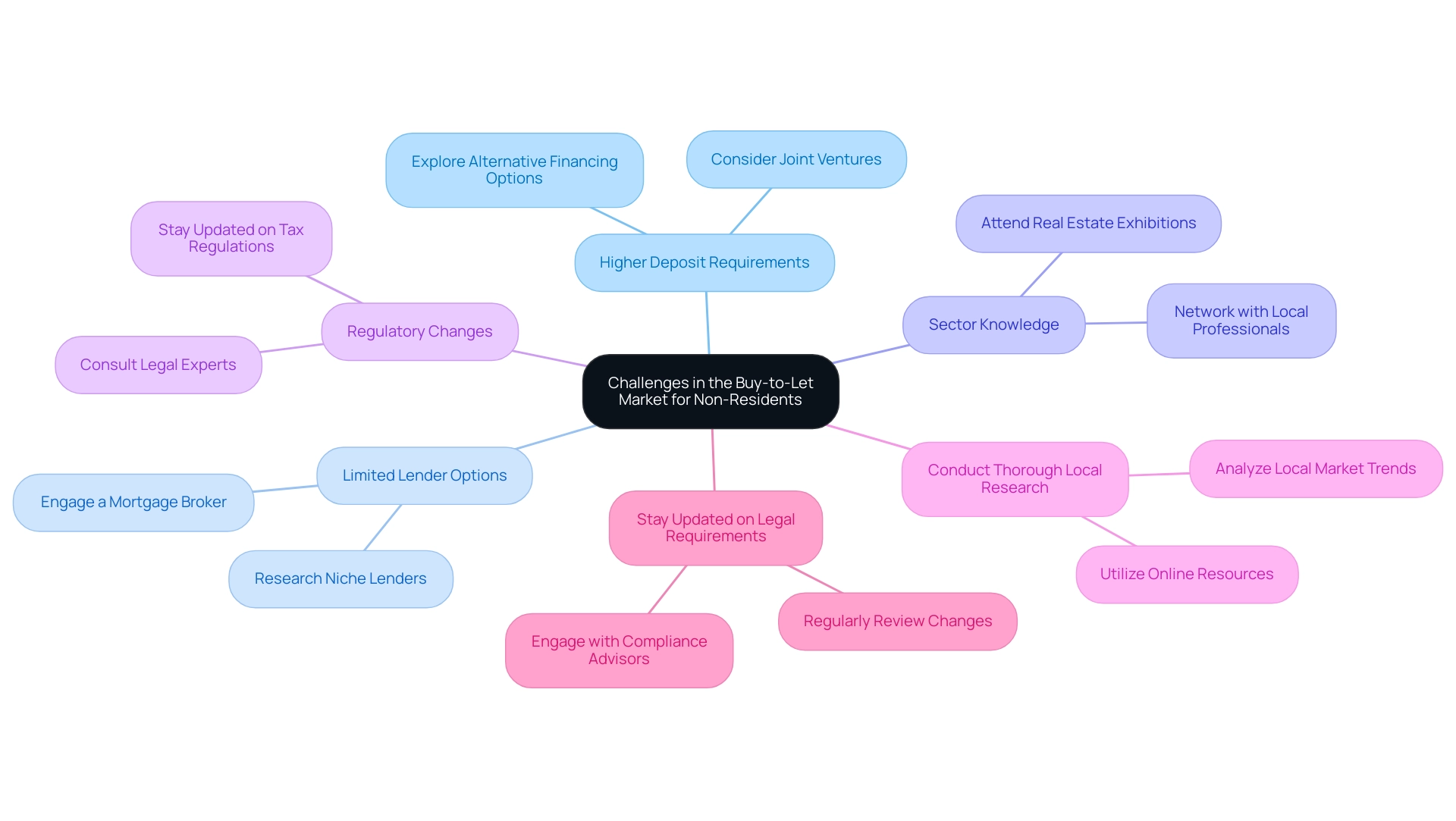
Conclusion
The UK property market offers a compelling opportunity for non-resident investors, particularly in the area of buy-to-let mortgages. The potential for attractive rental yields and property appreciation is significant; however, investors must navigate challenges such as higher deposit requirements and complex eligibility criteria effectively. A deep understanding of the nuances of buy-to-let mortgages, including financial considerations and tax implications, is essential for making informed investment decisions.
Engaging with knowledgeable mortgage brokers and conducting thorough market research can significantly enhance non-residents' chances of securing favorable financing options. The insights provided throughout this article underscore the importance of preparation and the value of expert guidance in overcoming common obstacles. With tailored financial solutions and access to diverse lending options, investors can confidently position themselves within the UK property market.
Ultimately, the combination of strategic investment, informed decision-making, and professional support paves the way for non-residents to capitalize on the lucrative opportunities available in the UK’s buy-to-let sector. As the market continues to evolve, staying informed and adaptable will be key to achieving long-term success in property investments.

